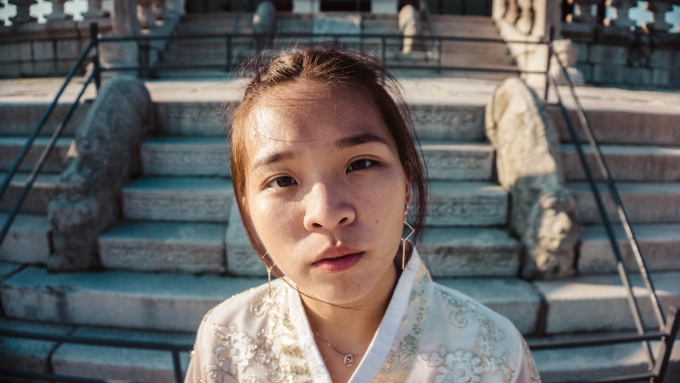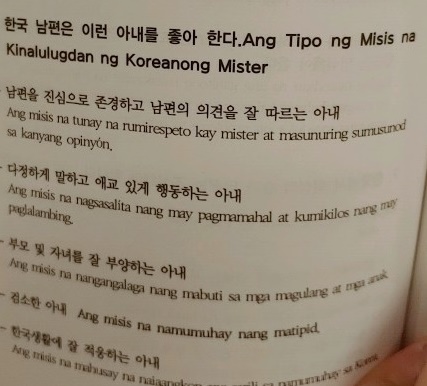It’s difficult to feel much outrage over the inclusion of genuine couple-talk like “I’m having my period” and “Do you want to make love tomorrow?” in Korean textbooks for foreign brides. But “Korean men like women who speak in cutesy aegyo“? “Your spouse’s greater financial power and living standards must be respected”??
 Estimated reading time: 4 minutes. Photo by Yeo Khee on Unsplash.
Estimated reading time: 4 minutes. Photo by Yeo Khee on Unsplash.
My translation of the following article, as I’ve yet to see any mention of the news in the English-language media. Unfortunately, Korean libel and defamation laws being so draconian, no source actually provides the titles of the offending books, nor the names of their publishers; this makes it impossible to determine what different language editions were published, or which say what exactly. What some of them do appear to say however, is very telling:
“이주여성용 한국어 교재는 가부장제 가이드북?”
“Migrant woman’s teaching materials for learning Korean are patriarchy guidebooks?”
Yonhap, August 26 2019, by Intern Reporter Kim Min-ho (nowhere@yna.co.kr; Kakaotalk: okjebo)
“한국에 온 지 얼마 되지 않아 친정집을 도와달라 하거나 직업을 갖는다고 하면 안 된다”, “한국에서 결혼하면 바로 자녀를 가져야 한다”(한국어-베트남어 교재), “한국에서 결혼한 여성이 술이나 담배를 하면 절대로 안 된다”(한국어-몽골어 교재)
“You should not ask for help for your parents or get a job as soon as you arrive in Korea,” “If you get married in Korea, you should have children immediately” (Korean-Vietnamese textbook), “Women who get married in Korea should absolutely not drink or smoke” (Korean-Mongolian textbook).
베트남어, 필리핀어, 몽골어 등 사용자에게 기초 한국어를 소개한 회화책에 ‘한국 생활에서 신부가 유의할 점’이라는 제목으로 달린 부록의 내용이다. ‘국제결혼을 한 이주여성과 한국인을 위해 집필됐다’고 소개된 이들 책이 왜곡된 사실과 차별적 시선을 담고 있다는 비판이 나온다.
These suggestions are to be found in a suplementary chapter entitled “Tips about Korean Life for Brides” found in various different language versions of a conversation book that introduces basic Korean to Vietnamese, Filipino, and Mongolian readers. These books, aimed at migrant women and overseas brides of Korean men, have been criticized for containing distorted facts and sexually discriminatory views.
이들 한국어 교재는 한국 남성이 좋아하는 여성상을 ‘부모와 자녀를 잘 부양하는 여성’, ‘애교 있게 말하는 여성’ 등으로 표현하기도 했다.
These Korean textbooks extol the virtues of “women who take good care of their parents [in-law]” and “women who speak in cutesy aegyo,” claiming that those traits are what Korean men prefer. (Right: 필리핀어-한국어 회화책 일부, 촬영 김민호; Part of Filipino-Korean conversation book, shot by Kim Min-ho.)
한국 유학 3년 차인 베트남인 A(23)씨는 베트남어-한국어 회화책 속 내용에 대해 “이주여성은 인형이 아닌데 자신의 행복을 비롯해 많은 걸 포기해야 하는지 모르겠다”며 “이 책대로라면 한국에 오면 인간답게 살지 못할 텐데 책을 읽고 한국에 오고 싶을 외국 여성은 없을 것 같다”고 말했다.
A Vietnamese woman “A” (23), who has been studying in Korea for three years, said, “A migrant woman is not a doll. I’m not sure [living or getting married in Korea] should mean I have to give up a lot of things, including my happiness.” She added, “According to this book, I shouldn’t live like a human being if I come to Korea. I don’t think there will be any foreign women at all who would want to come here after reading such a book.”
부록에 담긴 한국 생활 안내뿐 아니라 본문에 실린 한국어 예시문도 비판 대상이다.
“오늘은 생리 날이에요”, “내일 사랑을 나누면 어떠세요?”(한국어-벵골어 회화책)
인도 일부 지역과 방글라데시에서 사용하는 언어인 벵골어-한국어 회화책에는 남녀의 성적 관계에 대한 직접적인 표현이 등장한다.
In addition to “Tips about Korean Life for Brides” in the supplementary chapter, some Korean sample sentences in the body of the book have been criticized. [In particular], in the book for speakers of Bengali, a language which is widely spoken in Bangladesh and parts of India, there are very blunt and direct expressions about sexual relationships between men and women, such as “I’m having my period today” and “Do you want to make love tomorrow?”.
‘yu_hy****’라는 아이디를 쓰는 트위터 이용자는 “한국 남성은 자존심이 강한 편이다”, “배우자의 현재 경제력과 생활 수준을 존중해야 한다” 등의 표현이 담긴 벵골어 회화책 사진을 올리며 “‘한국 가부장제에서 살아남기’라는 부제가 붙어야 할 것 같다”고 비판했다.
The Twitter user ‘yu_hy ****’ posted a picture of the offending page of the book, which also included such sample sentences as “Korean men tend to have a lot of self-esteem and pride” and “Your spouse’s current financial power and living standards must be respected” [James—I feel that a “greater” is strongly implied at the beginning of that sentence]; they felt a subtitle to the book title “Surviving the Korean patriarchy” should be attached to it. (Left: 벵골어-한국어 회화책 일부[트위터 캡처; Part of Bengali-Korean conversation book, from Twitter capture.)
남녀 성관계에 대한 직접적이고 세부적인 표현은 결혼 이주여성이 주로 보는 동남아권 언어를 다룬 교재에는 종종 등장하는 반면 서구권 언어-한국어 교재에서는 발견하기 쉽지 않다는 점이 대조적이다.
프랑스어나 일본어 사용자를 대상으로 한 한국어 회화책을 보면 사랑과 연애에 관한 표현을 싣더라도 ‘좋아해요’, ‘당신을 사랑해요’ 등으로만 표현됐다.
[Moreover], while such direct sex-related expressions are common in language books for South and Southeast Asian readers [from poor countries], who would primarily be foreign brides, they are not easily found in Korean textbooks [intended for speakers from rich countries.] If you look at Korean conversation books for French or Japanese speakers, the only expressions covering relationships that can be found in those are things like “I like you” or “I love you.”
필리핀 결혼이주여성의 한국 정착 생활을 지원하는 비영리법인 ‘아이다 마을’의 현제인(49) 대표는 “이주여성을 한명의 인간으로 보지 않는 시선이 한국어 교재에도 반영된 것”이라며 개선을 촉구했다.
이들 교재를 펴낸 출판사 관계자는 “수정이 필요한 내용이 담긴 것을 인지하고 있으며 수정을 한 것도 있고 앞으로 할 부분도 있다”면서 “팔려나간 책을 회수하는 것은 어렵겠지만 조금씩 고쳐나가고 있다”고 해명했다.
Hyeon Jae-in (49), president of Aida Village, a non-profit organization that supports Filipino married immigrant women in South Korea, called for improvements in the Korean textbooks.
The publisher responded to the criticisms that, “We are aware of the content that needs to be corrected, and we have made some corrections and minor changes and are in the process of reviewing other parts”, but “It is difficult to recover sold books.”
이 출판사가 차별적 내용을 담았다고 자체 판단해 내용 수정을 한 인도네시아어-한국어 회화책은 성적 관계 묘사를 싣지 않고 전화 사용법, 약국 이용법 등 실생활에 필요한 대화를 중심으로 구성했다. 또 ‘한국 생활 중 신부가 유의할 점’이란 제목의 부록도 삭제했다.
The publisher further noted that it had already removed offending content on its own initiative from the Indonesian-Korean conversation book, and that included Korean necessary for daily life such as phone usage and visits to the pharmacy, without that covering sexual relationships. The “Tips about Korean Life for Brides” in the appendix was also removed. (End)
If you reside in South Korea, you can donate via wire transfer: Turnbull James Edward (Kookmin Bank/국민은행, 563401-01-214324)




This is quite interesting. I wonder why they are more sexually explicit when the spouse comes from a less economically developed country. Are they assuming that the relationship will be entirely transactional i.e. money for sex and children? Or, to be more charitable(?), are they assuming in a kind of prejudiced way that that’s how “poor people” talk?
LikeLike
Thanks, and sorry for the slow reply.
To play Devil’s Advocate, I think the complaints about the differences in content between these very specialized guidebooks and more mainstream textbooks are a little misguided.
My long and bitter experience with Korean textbooks is that most tend to be as bland and uncontroversial as possible, as they’re intended for as wide as possible an audience, including for learners from countries which aren’t very open about sex. In contrast, recent brides of Korean men probably would indeed very much like to know sex (etc.)-related expressions, and be the group least likely to be offended by them.
If any specialized guidebooks for, say, French wives of Korean men didn’t have such expressions, while as we know guidebooks for Bangladeshi wives do, then I think there’d be a valid reason for complaint. Unfortunately though, the author doesn’t divulge what languages the guidebooks were published in, nor their contents, so it’s impossible to say.
It’s really quite a frustrating article, frankly!
LikeLike